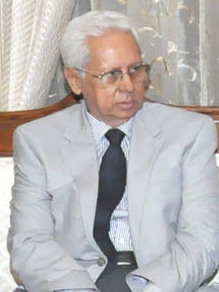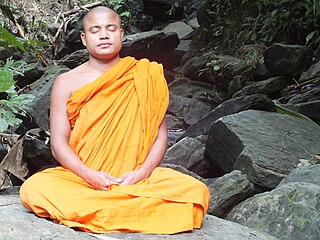Related Research Articles

Dhaka Medical College and Hospital (DMCH) is a public medical college and hospital located in Dhaka, Bangladesh.It houses the largest and most reputed medical college and hospital of the country. The hospital ranks among top 20 worldwide, based on size and number of patients. Established on 10 July 1946, the college houses a medical school as well as a tertiary care hospital on its campus.
The United Nations categorizes Bangladesh as a moderate democratic Muslim country. Sunni Islam is the largest religion in the country and in all of its districts, except Rangamati. The Constitution of Bangladesh refers to Islam twice: the document begins with the Islamic phrase Bismillahir Rahmanir Raheem and article (2A), added later, declares that: "Islam is the state religion of the republic".
The Constitution of Bangladesh includes secularism as one of the four fundamental principles, despite having Islam as the state religion by 2A. Islam is referred to twice in the introduction and Part I of the constitution and the document begins with the Islamic phrase Basmala which in English is translated as “In the name of Allah, the Beneficent, the Merciful” and article (2A) declares that :"Islam is the state religion of the republic". Bangladesh is mostly governed by secular laws, set up during the times when the region was ruled by the British Crown.
Bangladesh Hindu Buddhist Christian Unity Council also known as the Bangladesh Hindu Bouddha Christian Oikyo Parishod is a non-profitable organization established to protect the human rights of the religious and ethnic minorities of Bangladesh. BHBCUC is not biased to any religion or political parties or government and not meant for economic or any personal interest. The members and public donations are the source of fund for this charitable organization.

Chitta Ranjan Dutta Bir Uttom, also known as C R Dutta, was a Bangladeshi war hero who served as major-general of the Bangladesh Army. He was a key sector commander of the Mukti Bahini during the Bangladesh Liberation War. After independence, he served as the armed forces commander in Rangpur and later went on to become the first director-general of the Bangladesh Rifles in 1973.

On 28 February 2013, the International Crimes Tribunal sentenced Delwar Hossain Sayeedi, the vice-president of the Jamaat-e-Islami to death for war crimes committed during the 1971 Bangladesh Liberation War. Following the sentence, activists of Jamaat-e-Islami and its student wing Islami Chhatra Shibir attacked Hindus in different parts of the country. Hindu properties were looted, Hindu houses were burnt into ashes and Hindu temples were desecrated and set on fire. While the government has held the Jamaat-e-Islami responsible for the attacks on minorities, the Jamaat-e-Islami leadership has denied any involvement. Minority leaders have protested the attacks and appealed for justice. The Supreme Court of Bangladesh has directed law enforcement to start suo motu investigation into the attacks. The US Ambassador to Bangladesh expressed concern about attacks by Jamaat on the Bengali Hindu community.
2013 Bangladesh violence refers to the political instability, increase in crime and widespread attacks of minorities and opposition activists.
Debesh Chandra Bhattacharya was a Bangladeshi jurist who served at Bangladesh High Court and later at the Appellate Division of Bangladesh Supreme Court.
Dabirul Islam is a Bangladesh Awami League politician and the incumbent Jatiya Sangsad member representing the Thakurgaon-2 constituency since 1996, during 1991–1996 and 1986–1988. He is chairman of the Standing Committee on Ministry of Chittagong Hill Tracts Affairs. He is a 7-term Jatiya Sangsad member representing the Thakurgaon-2 constituency.

Syed Muazzem Ali was a Bangladeshi foreign service officer and career diplomat. In 2020, he was posthumously conferred the Padma Bhushan award, the third-highest civilian honour of India.
Mahabub Ara Begum Gini is a Bangladesh Awami League politician, member of parliament, and a whip in the parliament.

A. K. M. Bahauddin Bahar is a Bangladeshi politician from Awami League and a former Jatiya Sangsad member representing the Comilla-6 constituency. His original name is Abul khayer muhammad bahauddin bahar

Dhaka City Football Club is a football team from Dhaka, Bangladesh. The club currently a team of the Bangladesh Championship League.

Upaban Express is an intercity train running from Dhaka to Sylhet under Bangladesh Railway. Upaban Express was inaugurated on 4 May 1988. Three other intercity trains, Parabat Express, Jayantika Express and Kalni Express run on this route.
Banshkhali carnage was a targeted killing of 11 members of a Hindu family to grab their land in Bangladesh. There has been no verdict in the criminal case filled over the incident. The accused in the case include politicians of Bangladesh Nationalist Party.
The 2021 National budget of Bangladesh was presented by the Minister of Finance Mustafa Kamal on 3 June 2021. The National budget is for the fiscal year beginning on 1 July 2021, and ending on 30 June 2022. The budget was the second to be presented amid the Coronavirus pandemic.
From 13 to 19 October 2021, Muslim mobs instigated communal violence against Hindu communities across Bangladesh during the Durga Puja festival, in response to a viral video where Quran was kept under a temple idol's feet. More than 50 temples and makeshift worship arrangements were vandalised all over Bangladesh.
Habibur Rahman Khan was a judge of the High Court Division of Bangladesh Supreme Court and the only chairman of the Truth and Accountability Commission.
Air Astra is a privately owned Bangladeshi passenger airline headquartered in Dhaka based at Hazrat Shahjalal International Airport.

Dutanga bhante SaranankarMohathera is a Bangladeshi Buddhist monk, preacher, Buddhist rights activist, and the chief abbot of the Gayanasarana Buddhist Forest Monastery, in Rangunia, southeastern Chittagong District.
References
- ↑ "Minority leader named as Diplomat". ModernGhana. Retrieved 29 March 2022.
- ↑ "Minority bodies announce weeklong demo seeking election deferment". UNB. Retrieved 29 March 2022.
- ↑ "Be united to keep Bangladesh-India friendship unharmed: Abdur Razzak | News". BSS. Retrieved 29 March 2022.
- ↑ "Bangladesh sending investigators to Nepal". Times of Assam. 30 October 2011. Archived from the original on 11 August 2022. Retrieved 29 March 2022.
- ↑ "Representative of minorities in EC sought". New Age. Retrieved 29 March 2022.
- ↑ bdnews24.com. "নিমচন্দ্রের কেলেঙ্কারি: ঢাকা ফিরেছে তদন্ত দল". নিমচন্দ্রের কেলেঙ্কারি: ঢাকা ফিরেছে তদন্ত দল. Retrieved 9 September 2024.
{{cite web}}: CS1 maint: numeric names: authors list (link) - ↑ "DU teachers and students observe Black Day". Dhaka Tribune. 23 August 2020. Retrieved 29 March 2022.
- ↑ "Prof Neem sent to jail on surrender". The Daily Star. 19 September 2007. Retrieved 29 March 2022.
- ↑ "4 DU students appeal against conviction". The Daily Star. 19 March 2008. Retrieved 29 March 2022.
- ↑ "Neem Bhowmik new envoy to Nepal". bdnews24.com. Archived from the original on 29 March 2022. Retrieved 29 March 2022.
- ↑ "20 receive Mother Teresa Gold Medal". The Daily Star. 22 July 2010. Retrieved 29 March 2022.
- ↑ "Nepal wants Bangladesh envoy recalled". bdnews24.com. Archived from the original on 29 March 2022. Retrieved 29 March 2022.
- ↑ Karim, Rezaul (30 June 2012). "Major changes in foreign office". The Daily Star. Retrieved 29 March 2022.
- ↑ "Probe body to check allegations". The Daily Star. 19 July 2011. Retrieved 29 March 2022.
- ↑ "ক্ষমা পাচ্ছেন রাষ্ট্রদূত নিমচন্দ্র ভৌমিক". banglanews24.com (in Bengali). 17 November 2011. Retrieved 9 September 2024.
- ↑ Refugees, United Nations High Commissioner for. "Refworld | Bangladesh: Information on the Bangladesh, Hindu, Buddhist and Christian Unity Council (Bangladesh, Hindu, Buddhist Christian Oihya Parishad); on the name of the general secretary; and on whether the organization issues membership letters to individuals who have left the country". Refworld. Retrieved 29 March 2022.
- 1 2 "Neem Bhowmik new envoy to Nepal". bdnews24.com. Archived from the original on 29 March 2022. Retrieved 29 March 2022.
- ↑ Pintu, Rafiqul Islam. "Dr NC Bhowmik president, Rana Dasgupta secretary". The Asian Age. Retrieved 29 March 2022.